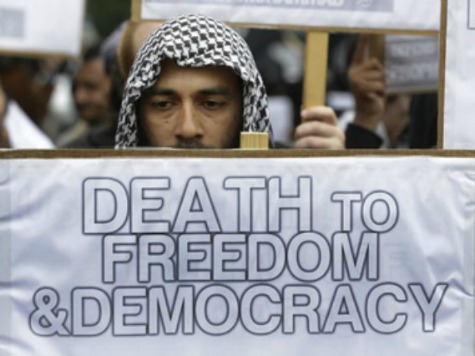Writing at the American Thinker, Raymond Ibrahim examines the phenomenon of the radicalization of Muslims in the Western world.
A new Danish statistical study finds that “Muslims [are] 218 percent more criminal in second generation than first.” While some of these crimes are clearly related to Islam – such as attacks on Muslim apostates to Christianity – others, such as rampant theft against non-Muslims, would appear banal, until one realizes that even robbery and plunder are justified by Islamic doctrine – as one U.K. Muslim cleric once clearly said.
The interesting question here is why second-generation Muslims, who are presumably more Westernized than their Muslim parents, are also more “radical.” Lest one dismiss this phenomenon as a product of economics or some other “grievance” against European host nations, the fact is, even in America, where Muslims are much better assimilated than in Europe, young Muslims are turning to “radicalism.”
For example, some time back, Attorney General Eric Holder said that “the threat [of terrorism] has changed … to worrying about people in the United States, American citizens – raised here, born here, and who for whatever reason, have decided that they are going to become radicalized and take up arms against the nation in which they were born.”
Around the same time, Sue Myrick, then a member of Congress, wrote a particularly candid letter on “radicalization” to President Obama:
For many years we lulled ourselves with the idea that radicalization was not happening inside the United Sates. We believed American Muslims were immune to radicalization because, unlike the European counterparts, they are socially and economically well-integrated into society. There had been warnings that these assumptions were false but we paid them no mind. Today there is no doubt that radicalization is taking place inside America. The strikingly accelerated rate of American Muslims arrested for involvement in terrorist activities since May 2009 makes this fact self-evident.
Myrick named several American Muslims as examples of those who, while “embodying the American dream, at least socio-economically,” were still “radicalized,” astutely adding, “The truth is that if grievances were the sole cause of terrorism, we would see daily acts by Americans who have lost their jobs and homes in this economic downturn.”
Quite so. Yet, though Myrick’s observations were limited to the domestic scene, they raise the following, more cosmic, question: if American Muslims, who enjoy Western benefits – including democracy, liberty, prosperity, and freedom of expression – are still being radicalized, why do we insist that the importation of these same Western benefits to the Muslim world will eliminate its even more indigenous or authentic form of “radicalization”?
Read the rest of the story at the American Thinker.

COMMENTS
Please let us know if you're having issues with commenting.